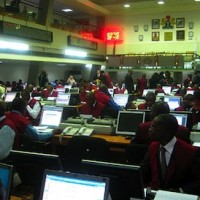Stock Market Moves 91% Close to 2008 Peak
Riding on the back of impressive financial results and growing investor confidence, the Nigerian stock market has moved 91 per cent close to its 2008 peak with the market capitalisation closing at N11.49 trillion last Monday.
Following the banking consolidation exercise in 2005, the equities market rode on the back of an unprecedented bull run, which peaked at a market capitalisation of N12.62 trillion in March 2008.
But the market recorded a steep decline that began that same month following the contagion from the global financial crisis as well as the local banking crisis.
By November 2011, half of the market value had been wiped out, leaving the market capitalisation to close at N6.27 trillion. However, reforms initiatives including the establishment of Asset Management Corporation of Nigeria (AMCON), and return of foreign and institutional investors led to a gradual recovery in the market since last year.
THISDAY checks showed that the market is less than 10 per cent to hit its 2008 peak as investors’ sentiments, fuelled by the impressive 2012 full year and 2013 first quarter financial results of banks and leading blue chip firms, remained positive.
Specifically, the market capitalisation closed at N11.49 trillion, while Nigerian Stock Exchange (NSE) All-Share Index stood at 35,956.05. Comparatively, the market capitalisation has recorded 91 per cent of recovery, on its way to its 2008 peak of N12.62 trillion. Year-to-date, the market has recorded 28.1 per cent growth of recovery.
Despite certain prevalent, national and market-specific challenges which persisted all through the year, the Nigerian capital market was one of the top-four performing capital markets globally in 2012 with the bourse’s major index closing the year with its strongest performance since 2008.
With the second quarter of 2013 underway, the market has shown clear signs of stability as the market capitalisation remaining above the N10 trillion mark from late January 2013 till date.
Domestic investors have increased their patronage of the market which led to their accounting for about 60 per cent of transaction value at the end of first quarter 2013, while foreign investors accounted for about 40 per cent.
This development contrasts sharply with the circumstances between 2009 and the first half of 2012 when local investors stayed away from the market on account of losses they sustained in the aftermath of the near meltdown of 2008.
The Chief Executive Officer of the NSE, Mr. Oscar Onyema, said while the NSE had focused on cleansing, restructuring and making the market more accessible over the last years, its focus in 2013 will be on innovations, centred on technology and product development, as well as on advocating changes to policy and continued financial literacy programmes alongside investor education.
(This Day)








